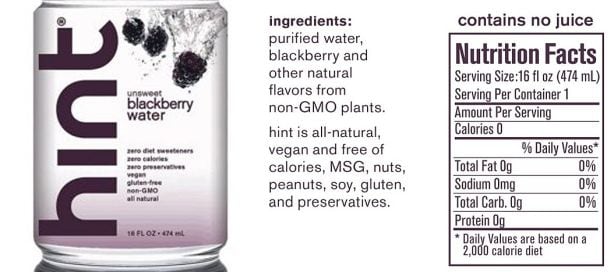The lawsuit*, filed in California on January 17, is an unusual one, because it focuses on propylene glycol (PG) an FDA-approved synthetic substance widely used as a solvent or incidental additive in ‘natural flavors‘– which are clearly defined in law.
Plaintiff Lisa Kim Madrigal – represented by the Joseph Farzam law firm – however, says consumers would not expect to find PG – “a synthetic substance” that is “chemically manufactured and highly processed” - in a product marketed as ‘all-natural’ (a term that doesn’t have a clear legal definition).
In court papers filed last week, however, Hint noted that the FDA unveiled a probe into ‘natural’ claims in late 2015 and in light of this, several class action lawsuits over ‘natural’ claims had recently been stayed by the courts on primary jurisdiction grounds (ie. that this is a matter the FDA is currently investigating). The court, therefore, should “similarly stay this action,” argued Hint.
“The FDA’s interpretation of the appropriate or inappropriate uses of ‘natural’ will necessarily inform the court’s decision in this case.”
'Natural' is not defined in law, but 'natural flavor' is
So what does the law say?
There is no legal definition of ‘natural’ or ‘all natural,’ just FDA guidance issued in 1993 noting that, “[FDA] has not objected to the use of the term [natural] on food labels provided it is used in a manner that is truthful and not misleading and the product does not contain added color, artificial flavors or synthetic substances.”
However, there is a legal definition of natural flavors (21CFR501.22), which the FDA says means “the essential oil, oleoresin, essence or extractive, protein hydrolysate, distillate, or any product of roasting, heating or enzymolysis, which contains the flavoring constituents derived from a spice, fruit or fruit juice, vegetable or vegetable juice, edible yeast, herb, bark, bud, root, leaf or similar plant material, meat, seafood, poultry, eggs, dairy products, or fermentation products thereof, whose significant function in food is flavoring rather than nutritional.”
And while synthetic solvents such as propylene glycol and hexane are not allowed in the production of organic certified products, they are permitted in ‘natural flavors.'

The GRAS-approved substance propylene glycol (PG) can serve as an anticaking agent, a dough strengthener, an emulsifier, a flavor agent, a formulation aid, a humectant, a processing aid, a solvent and vehicle, a stabilizer and thickener, a surface-active agent, and a texturizer.
'PG is a very common solvent. Especially in these days of Non-GMO'
And as long as the amount left in the final product has no functional effect, they do not need to be declared on the ingredients statement, as they are effectively operating as ‘incidental’ additives that are present in a food at insignificant levels and do not have any technical or functional effect in that food, one industry source told FoodNavigator-USA.
“If the flavor retains a ‘functional’ carry-over amount of an extraction solvent, this must be declared on the ingredient list. Thus a large amount of PG would be listed on an ingredient list (eg. Propylene glycol 50%, Natural flavoring 50%).
“PG is a very common solvent. Especially in these days of Non-GMO. Since it is synthetic, it is non-GM. Compared to glycerin and ethanol derived from plants that need a paper trail to prove non-GM, PG is a common go to - but as such, it is functional in the flavor as a carrier. However, if the use rate of the finished flavor in the water were really low, then they could determine that the PG is not functional and therefore not have to claim its presence.”
Legal reaction
Amanda Groves, a partner at Winston & Strawn, told FoodNavigator-USA in January (when the case was filed): "An attack on the “natural flavor” ingredient description should be preempted given the definition of natural flavor provided in the regulations. [But] I suspect the plaintiffs will argue that regulation does not cover the 'all natural' label."
Hint COO: We intend to defend ourselves
Hint chief operating officer Theo Goldin told FoodNavigator-USA that the case lacked merit, adding: “On behalf of our fans, ourselves and future entrepreneurs who will join us in trying to make the world a healthier place, we intend to defend ourselves rather than contribute to a toxic legal environment that encourages more and more lawyers to file these shakedown lawsuits.”
*The case is Lisa Kim Madrigal et al v Hint Inc BC 646991 filed on January 17 in the Superior Court of California, county of Los Angeles.
Further reading:
